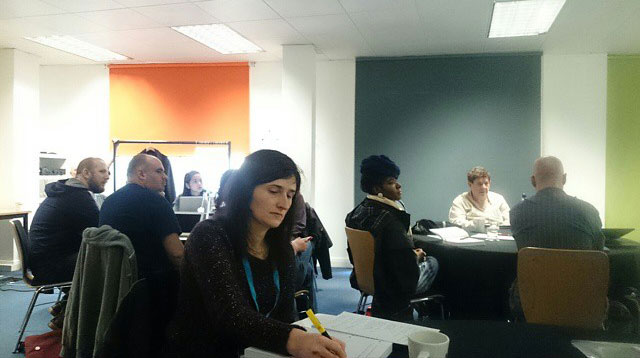
This is Day 7 in the 30 Day Blogging Challenge. You can read Day 6’s post here.
Morning


Rachel McCollin warned us that spookily, the location of room 2 had moved from upstairs to further away on level 2. Was this something to do with the TARDIS in the building, I wonder?
Petra Foster

Petra Foster delivered a lively and entertaining speech on how to Be a Brand, Not a Commodity. This was one of my favourite presentations of the weekend.
Petra told us her story – she became an entrepreneur in 2013 when she decided to set up a T-shirt printing business with her husband. She decided she needed a website and paid a lot of money monthly for one and SEO, then later realised it was rubbish.
So she went along to a WordPress Meetup, learned to do it herself and succeeded in ranking on page 1 of Google for her chosen keywords. She then got asked to help other businesses with their websites, and thus got into the industry.
Petra explained that for her, a website and branding strategy must go hand in hand. She markets herself as a branding consultant, not a web designer.
Key takeaways:
- Branding is an emotional connection repeated over time.
- Decide what your brand will stand for in your audience’s eyes. Who do you help, what are you passionate about and what do you want people to think of you?
- You can’t market to everyone, so need to create a brand that appeals to a specific audience.
- Distinguish yourself and share your opinions. It might make you a bit Marmite, but you’ll be remembered for it. She dresses and looks different from the norm, and therefore stands out.
- Be consistent with your branding across all media.
- You don’t need thousands of social media followers.
- Commodities compete on price – brands compete on purpose and emotion.
Pauline Roche and Ted Ryan

WordPress for Small and Not For Profit Enterprises was the title of the next talk, by Pauline Roche and Ted Ryan. Pauline and Ted own a consultancy which helps microbusinesses and third sector organisations.
They explained about their work in the third sector. The culture is often that grant funding is scarce, money is tight and individuals think they can build their own websites. Despite these issues, they find it a fulfilling sector to work in.
Relationship building is important – long term business relationships can develop and work can be gained over a period of months or years, as funding allows. Some people have a website built and don’t use it for months, so be prepared for longer-term enquiries.
Third sector businesses are looking for the following from their websites:
- Publicising their organisation (this could include a blog)
- Information on their services and activities
- Social media links and sharing
- Keeping in contact with members
- Maintaining privacy
Paul Cherry

Paul Cherry, a marketer for 15 years, talked about Customers and the Web. In his opinion, customer experience is key in the sales and marketing process. You need to think about how you want your customers will think, feel and act. Misjudge any one of these and it will impact on the other two.
Paul recommended Google Think as a source of customer data and analytics. The majority of web traffic (up to 70%) starts with offline work.
Paul has started a headphones hire company, Place Over Ears, and talked about how his own usability studies refined the website design. Customers wanted to know that the headphones are cleaned after each use, so he made that a prominent feature of the homepage.
Paul finished by saying that it’s okay if you don’t like to do things – either ask others to help, or learn yourself to improve at those things.
Ben Furfie

In the final talk of the morning, web designer and GenesisWP-er Ben Furfie explained Why it’s time to stop using Photoshop for web design.
Ben used to use Photoshop for designing websites, but he found generates lots of files and is ill-suited for responsive design. He tried Adobe Edge Reflow, but it had bugs. So he switched to Sketch. It’s available for Mac only and there’s a 14-day free trial, or you can buy it for $99 (considerably cheaper than Photoshop or Creative Suite).
Sketch is a vector-based program, using layers, which blends the best of Photoshop and Illustrator. It excels at:
- colours
- shadows
- sizing elements correctly
- reusing elements
- automatic layouts (including responsive layouts)
- exporting icons
Ben demoed a site that he’d designed in Sketch. He finds it a real time saver, and said it wasn’t too hard to learn – about 2 months to grasp the main functionality.
For lunch, I joined the UK Genesis crowd again for fish and chips at The Shakespeare pub.
Afternoon
Karl Craig-West

In the afternoon, I chose to take part in Karl Craig-West’s workshop on How to market and sell more WordPress websites.
Karl runs his own company, Buzz Webs, based in Leicestershire. His approach is to help customers develop their marketing channels as well as develop their website. Clients agree to take an active role in marketing their website.
Marketing secret #1: Make it your top business priority
Nothing else is more important to your business. Your ability to sell trumps your ability to deliver the work.
Marketing secret #2: Do some marketing every day
It has to be an ongoing process. He does a marketing “power hour” daily – anything from 20 to 90 minutes.
Marketing secret #3: Track your marketing efforts
If you don’t know what your baseline is, you can’t see what works and what doesn’t.
Marketing secret #4: Have a CRM system
A CRM system is essential. You should focus on increasing your database of customers. Use email autoresponders, but follow up with a personal message after a certain number of days. Don’t send out an email “newsletter” – call it something more enticing.
Marketing secret #5: Know your market
He has his market defined to a T:
- Age 35+
- Mainly women
- Mostly not technical
- Based in Leicestershire
- Self employed
- No more than 6 employees
Marketing secret #6: Use the right medium
Don’t waste time on platforms your ideal clients don’t use. If you get this right you can see a great ROI e.g. one client got £2,000 of business from £25 of Facebook ads.
Postal marketing can be very effective because it is novel nowadays. One business sent out tea making equipment to key potential clients with the message, “I’ve bought all the gear – will you have a cup of tea with me?” This £800 spend won £35,000 of work.
Marketing secret #7: Deliver the right message
Avoid jargon. Tell customers their website will work brilliantly on tablets and mobile, not that it will be responsive. Remember: benefits, not features.

Marketing secret #8: Give customers value
Be wary of offering free things – people don’t value them. His suggestion is to charge a small amount, or offer low-cost services for free and add them to invoices in brackets, so customers are aware of their value and appreciate it.
Marketing secret #9: Time-limit offers
Always limit offers and proposals to a deadline. Make sure you have a call to action.
Marketing secret #10: Ask for referrals
Most people don’t think to do this. Or offer an incentive for them. Remember to give something back (e.g. pizza) to keep up the goodwill.
Marketing secret #11: Get past price objections
The best ways to do this are:
- Offer different payment methods – he sells 50% of sites on payment plan.
- Build up the value – throw in (low effort) extras for free.
- Offer a money-back guarantee.
His company win 2/3 of projects they bid for.
Marketing secret #12: Offer different price points
He has 3 main website packages – basic, medium and super-duper. Most clients go for the middle one. (Often in a pricing table it will be labelled “most popular” or “best value”.)
Marketing secret #13: Upsell everything!
Always look to add on extra services. This particularly applies to existing clients – they’re easier to sell to.
I have to say a great thanks to Karl for the workshop – lots of useful tips to implement.
At 4pm the event wrapped up, and it was time to leave.
I went with Chris Booth (also from Edinburgh) to collect my suitcase from the Conference Aston and then headed back to the Shakespeare for one last drink and final farewell to the city and the attendees. Chris, James Roberts of LlamaPress and I were all on the same train, so it was nice to mull over the weekend and talk about our experiences together.
Overall thoughts and takeaways
- Kudos to the organisers – your hard work paid off handsomely.
- I loved the venue – excellent choice. The atrium was a lovely chill-out area.
UK Genesis Meetup members in the atrium - The workshops were a super idea and seemed well received. More next time please.
- It would have been nice if some sessions had been videoed, but I appreciate it’s time-consuming and costly to do well.
- Thanks to all the speakers and wonderful people I met over the weekend. Including, but not limited to: Angie Vale, Ben Furfie, Brian Duffy, Carlo Manf, Chelsea Haden, Chris Booth, Dave McCourt, Dave Pullig, Drew Kirkland, Fiona Barnes, Gary Jones, James Newland, James Roberts, Jason King, Jo Waltham, Jonny Allbut, Karen Bugg, Karl Craig-West, Kimb Jones, Kirsty Burgoine, Liz Delves, Mark Bugg, Mike Killen, Mike Pead, Nivi Morales, Pat Barnes, Paul Cherry, Paul Smart, Pauline Roche, Petra Foster, Rachel McCollin, Steph Walker, Sue Fernandes, Tomos Jones, Tony Scott. You rocked!



Fab post and some brilliant information. Thank you Claire x
Wow, that’s quite a write-up. Brilliant job and very well summarised.
Glad you enjoyed the session.
Karl
Great insight into the second day at WordCamp Claire, thank you.
Thanks for putting this together Claire – it really captures Day 2 of our fab event – thanks for coming!
HI Claire, didn’t get much of a chance to chat but see you at the next one. Found this a useful reminder of what I missed and needed to catch up on. Cheers!
Thanks for the writeup! We’ve never attended a WordCamp before but I think its something we should do after reading your post! ☺